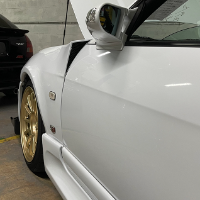Intermittent Starter Motor
Announcements
-
Similar Content
-
Latest Posts
-
By joshuaho96 · Posted
Yes, it will take a fair amount of solution but the sodium citrate + citric acid + detergent is cheap stuff. Use laundry detergent instead of dish soap if you want to reduce the bubbles, also you could just buy sodium citrate and add some citric acid to the mix until you get to a weakly acidic solution if you don't feel like dealing with all the bubbling generated by adding everything together. For a fuel tank you need quite a lot of distilled water but it's probably worth the effort. -
By Dose Pipe Sutututu · Posted
Actually looks like a Nitrous setup now 😆 -
By Dose Pipe Sutututu · Posted
@robbo_rb180 I already have a NEO head on the shitbox 😎 Just needs beehive springs so I can rev it past the 8600 rpm limiter, then again pointless too, turbo is out of puff lol. Wen da gods let me win lotto eh? -
By robbo_rb180 · Posted
Everyone I know with a90 supra at time attack aren't having issues with 3-5 fast laps so far and one is decent powered one too. Saw a k24 swapped 86 with a 8hp70 and big slicks and aero which had no drama's at QR and Manton Park. I've stuck a 25 row cooler in my setup with 8hp45/50 in the hopes of keeping the oil cool as I plan on some racing next year that 20-30min sessions. I've also geared my car so won't be using 7th and 8th gear too. @Dose Pipe Sutututu just needs to get that samsonas in already and have that tassie guy fit a head and rev it too 11ty thousand rpm. -
My embedded systems thoughts have me sitting with GTS on this. Variation between same phone hardware, should be small. However, the internal "intensity" or "volume" amount that say Google passes to the app, will be quite different, as the underlying hardware will be passing different levels for the same volume to the Google OS. Until the app creator has had each individual phone, and set benchmarks and calibrations for each, the amount of error can be quite huge. It can even be observed by using different phones, recording the same noise, and then playing it back, they end up soon ding different. A big reason for it, is even the different types of mics used in phones have different responses, and different frequency ranges. Then you need to get into the DSP, and the variations in those, their sample rates which then effect their frequency range, and then the quality of the DSP, and what type of hardware conversion they do to for the ADC within the DSP. Oh, and let's not forget at the low level phones are designed to cutout loud sounds. It's one of the reasons they suck in really loud environments (eg concerts). The louder you yell, the more you'll get cutout too Note DSP is Digital Signal Processor ADC is the analogue to data converter. I don't have any real data on what the variation would truly be, however, chat GPT says in general, their output is typically between +/-2dB to +/-5dB of what you're really measuring. So realistically, anything from 4 to 10dB variation is possible even with the same devices.
-






Recommended Posts
Create an account or sign in to comment
You need to be a member in order to leave a comment
Create an account
Sign up for a new account in our community. It's easy!
Register a new accountSign in
Already have an account? Sign in here.
Sign In Now